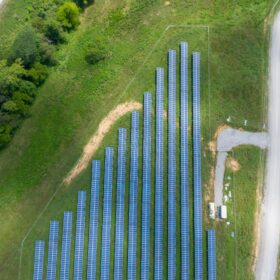This June, aging grid and high interconnection costs for a growing backlog of renewable energy projects became the focus of Massachusetts state legislators and solar industry leaders.
In a letter to the Department of Public Utilities (DPU), 25 state legislators voiced support for an interconnection cost allocation approach that would help ensure solar initiatives currently in Eversource and National Grid group interconnection studies can move forward in a fair, timely, and financially viable fashion.
Typically, interconnection in the state has occurred in a rolling single-basis fashion. With the advent of the Massachusetts SMART incentive program, an influx of new solar projects entered the interconnection queue. This led Eversource and National Grid to implement group studies to approve interconnection.

Image: Community Energy Solar
About 679 MW of solar were actively under review in the group studies, which began October 2020. Some projects submitted interconnection applications as long as three years ago and may have to wait an additional five years for upgrades to be completed, according to the letter. It called for a provisional interconnection cost-sharing solution for solar projects currently in development, targeting cost estimates from utilities in the next 1-3 years before system plans are approved.
In an interview with pv magazine, Jessica Robertson, Borrego Solar director of policy and business development, said “If we don’t have a new way of structuring cost allocation, the costs for all these projects will be prohibitive, and they will be cancelled.”
She warned that multiple solar projects would end up going back to the starting line without a process to share costs. The letter to the DPU estimated a potential loss of 6,800 jobs, and $300 million in lost municipal revenue due to interconnection costs and delays.
Borrego Director of Interconnection Policy Kathryn Cox-Arslan said one area for improvement is the concept of “free-ridership.” Projects that can afford the cost of interconnection upgrades are able to move forward, while other projects follow and take advantage of the enabled capacity.
“Projects should be paying their fair share for system access, but there should also be an acknowledgement that those upgrades don’t benefit just one facility, but support multiple facilities,” said Cox-Arslan this June.
Provisional victory
On the eve of this Thanksgiving, the DPU approved the provisional solution the letter requested, granting cost estimates to the roughly 679 MW of solar in development stuck in group studies in the state.
The provisional program essentially allows for broad cost-sharing for upgrades to transmission due to interconnection of the new projects that were in group study. It addresses the free-ridership issue, shifting some of the costs onto future projects that will take advantage of the same upgrades spurred by these group study projects.

Image: NREL/Dennis Schroeder
Transmission upgrades, distribution upgrades, or substation enhancements that will benefit multiple projects, not just the pioneering project that spurred the upgrade, can now be determined Capital Improvement Projects (CIPs) by the utility. Importantly, the CIPs must be completed within four years, and the CIPs cannot exceed $500/kW, setting a cap on what may have been cost-prohibitive fee for Borrego and many developers in the state. Developers face other fees, like express feeders and point-of-connection costs, so this cap was an important step, said Cox-Arslan.
Robertson said this may be the first time in the country’s history that upgrades are cost-allocated in this fashion, with a recognition that more distributed generation (DG) projects will interconnect in the future, shifting some costs ahead to those projects. “We’re not just being reactive, but taking a longer-term approach,” she said.
It bears keeping in mind that this cost-sharing structure is a provisional order, and only for the projects under group study. However, DPU is working on the long-term vision for the state, and developers are calling for this type of cost-sharing to be applied to all future projects.
Robertson said Borrego is pushing for the cost-sharing for CIPs in the long-term plan to go a bit further than the provisional plan does, and she is hopeful this model will be adopted by other DPUs in other states.
Next steps
The current CIP projects must now be justified to the DPU by the utility to approve the costs of the upgrades. Most of the group studies are not complete yet, and then they will have to enter an adjudicatory process. Cox-Arslan is hopeful that the DPU recognizes the urgency of the projects currently held up and that the CIP adjudication will happen in a timely manner.
On the long-term plan, the DPU has not expressly stated what its vision is yet, or what the horizon will be to develop and implement it. First, a department order must be created, and then the utilities must run a study on what the impacts of the new cost-sharing structure would be, which they said could take at least a year. After that, that plan would need to be implemented, which faces further approval.
Cox-Arslan and Robertson are hopeful that this long-term plan will be developed in tandem with the completion of the provisional CIP plans.
Time is of the essence. The Massachusetts clean energy and climate plan calls for a 2030 emissions limit at least 50% below the 1990 baseline. To decarbonize the grid, it will be important for Massachusetts DPU and the state’s utilities to speed the review processes, while developing a plan that integrates solar as long-lasting, resilient infrastructure.
This content is protected by copyright and may not be reused. If you want to cooperate with us and would like to reuse some of our content, please contact: editors@pv-magazine.com.









By submitting this form you agree to pv magazine using your data for the purposes of publishing your comment.
Your personal data will only be disclosed or otherwise transmitted to third parties for the purposes of spam filtering or if this is necessary for technical maintenance of the website. Any other transfer to third parties will not take place unless this is justified on the basis of applicable data protection regulations or if pv magazine is legally obliged to do so.
You may revoke this consent at any time with effect for the future, in which case your personal data will be deleted immediately. Otherwise, your data will be deleted if pv magazine has processed your request or the purpose of data storage is fulfilled.
Further information on data privacy can be found in our Data Protection Policy.